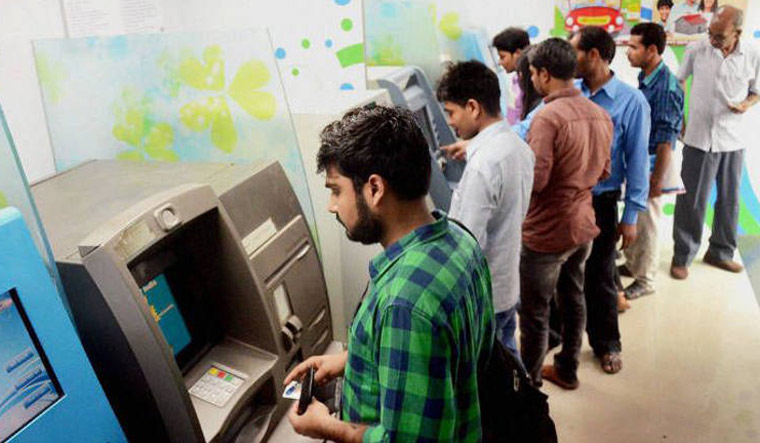Over the last one year, the Reserve Bank of India as well as the Ministry of Home Affairs (MHA) have come out with several regulations over the management of ATMs across the country. This has led to a rise in operational costs for the service providers and unless there is a commitment from the banks to bare it, it will be difficult to invest up front in meeting those regulations, a top official of the Confederation of ATM industry, has told THE WEEK.
Earlier this week the industry body had raised an alarm, stating that the service providers may be forced to close almost half of the 2.38 lakh ATMs across the country by March 2019.
The grim warning came in the backdrop of several new regulations that have been put in place and the timelines to meet some of these looming.
Some of the guidelines intended to make cash management more secure mandate shift to a cassette swap system instead of open cash replenishment at ATMs, use of armed guards when transferring cash, GPS and CCTV enabled vans, upgrading the operating systems of ATMs among other things, which will incur more costs.
“The RBI came up with guidelines with respect to upgrading of machines, and various aspects related to security. RBI also came out with guidelines in terms of cassette swap methodology for implementation at ATMs. The MHA guidelines tell you how cash movement is to happen in the country, which will have to be implemented to carry cash to ATMs. If you take these three guidelines into account, we need to invest about Rs 3,500 crore as an industry to make the compliance happen,” pointed V. Balasubramanian, director of CATMi.
One of the key changes that is on the cards is how the ATM machines are refilled with cash. Earlier banks would give cash to the ATM service providers, which would be carried in vans in trunks and each ATM would be refilled. Each ATM has four cassettes. Under the new regulations, instead of the transfer of cash, these cassettes, which hold the cash in the ATM machines, will have to be swapped with new ones. Some earlier estimates have suggested that around 480,000 more cassettes would be required under the new method to refill ATMs. That apart, there will be a need to set up vaults in more locations where cash coming from banks will have to be securely stored and the cassettes refilled and transferred to ATMs.
Some of the security guidelines issued by the RBI like implementing anti-skimming solutions have to be completed by March 2019 and all ATMs have to be upgraded to supported versions of operating systems by June next year, with 75 per cent by March. The cassette swap methodology has also to be implemented in phases.
“Our costs will increase by 40 per cent. Unless, banks agree to pay it, how will we invest and implement the guidelines? That's why we have said we will not be able to comply with the guidelines and that's why these 100,000-odd ATMs will shut,” said Balasubramanian.
While costs are rising on the one hand, revenue for providing ATMs as a service haven't grown. For instance, the interchange over the last five years have been unchanged at Rs 15 per cash transaction.
CATMi has made representations to the Indian Banks Association as well as the Reserve Bank of India with regards to the rising costs and is still awaiting a positive response, said Balasubramanian. He added that with deadlines looming, the investment needs to be done now by ATM service providers, but that can only happen if banks make a commitment to reimburse it.
State-run Punjab National Bank said on Thursday it had no plans to cut down on its 9,428 ATMs and the process of implementing the security measures had already begun at its ATMs.
“The challenge is that all banks have to agree,” said Balasubramanian.
NCR Corp, which is the largest ATM supplier in the country, wants banks, the managed service providers and regulators to discuss and resolve the issues.



